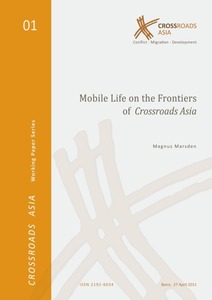Marsden, Magnus: Mobile Life on the Frontiers of Crossroads Asia. Bonn: Competence Network Crossroads Asia: Conflict – Migration – Development, 2011. In: Baldauf, Ingeborg; Conermann, Stephan; Kreutzmann, Hermann; Nadjmabadi, Shahnaz; Reetz, Dietrich; Schetter, Conrad; Sökefeld, Martin (Hrsg.): Crossroads Asia Working Paper Series, 1.
Online-Ausgabe in bonndoc: https://hdl.handle.net/20.500.11811/114
Online-Ausgabe in bonndoc: https://hdl.handle.net/20.500.11811/114
@techreport{handle:20.500.11811/114,
author = {{Magnus Marsden}},
editor = {{Ingeborg Baldauf} and {Stephan Conermann} and {Hermann Kreutzmann} and {Shahnaz Nadjmabadi} and {Dietrich Reetz} and {Conrad Schetter} and {Martin Sökefeld}},
title = {Mobile Life on the Frontiers of Crossroads Asia},
publisher = {Competence Network Crossroads Asia: Conflict – Migration – Development},
year = 2011,
month = apr,
series = {Crossroads Asia Working Paper Series},
volume = 1,
note = {In what ways do Chitralis and the wider region’s inhabitants themselves perceive, act within and seek to understand this geo-politically divided and culturally discontinuous space? I want to explore these questions now by considering three mobile fragments of Crossroad Asia that I have encountered during my work there: kinship ties between Chitralis and Badakshi Afghans; Chitrali experience of modern employment in both Tajikistan and Afghanistan; and the circulatory lives of Afghan traders in Chitral, northern Afghanistan and Tajikistan. Rather than seeking to show how all these ties come together to fashion a region, I hope to bring attention to the forms of skill and aptitude they require from those who seek to benefit from them, and the perils, often unexpected, involved in moving across this world. I have sought to emphasize the suite of skills and sensibilities that people use to move across this world, skills that include a willingness to move and travel for education, while also form close and intimate relations with people from ethnic and religious backgrounds very different from their own. The ideas that people hold about the world in which they live, such as those pertaining to national identities or Islam, are also embodied in relationships to their transregional pasts and experiences of mobility.},
url = {https://hdl.handle.net/20.500.11811/114}
}
author = {{Magnus Marsden}},
editor = {{Ingeborg Baldauf} and {Stephan Conermann} and {Hermann Kreutzmann} and {Shahnaz Nadjmabadi} and {Dietrich Reetz} and {Conrad Schetter} and {Martin Sökefeld}},
title = {Mobile Life on the Frontiers of Crossroads Asia},
publisher = {Competence Network Crossroads Asia: Conflict – Migration – Development},
year = 2011,
month = apr,
series = {Crossroads Asia Working Paper Series},
volume = 1,
note = {In what ways do Chitralis and the wider region’s inhabitants themselves perceive, act within and seek to understand this geo-politically divided and culturally discontinuous space? I want to explore these questions now by considering three mobile fragments of Crossroad Asia that I have encountered during my work there: kinship ties between Chitralis and Badakshi Afghans; Chitrali experience of modern employment in both Tajikistan and Afghanistan; and the circulatory lives of Afghan traders in Chitral, northern Afghanistan and Tajikistan. Rather than seeking to show how all these ties come together to fashion a region, I hope to bring attention to the forms of skill and aptitude they require from those who seek to benefit from them, and the perils, often unexpected, involved in moving across this world. I have sought to emphasize the suite of skills and sensibilities that people use to move across this world, skills that include a willingness to move and travel for education, while also form close and intimate relations with people from ethnic and religious backgrounds very different from their own. The ideas that people hold about the world in which they live, such as those pertaining to national identities or Islam, are also embodied in relationships to their transregional pasts and experiences of mobility.},
url = {https://hdl.handle.net/20.500.11811/114}
}






